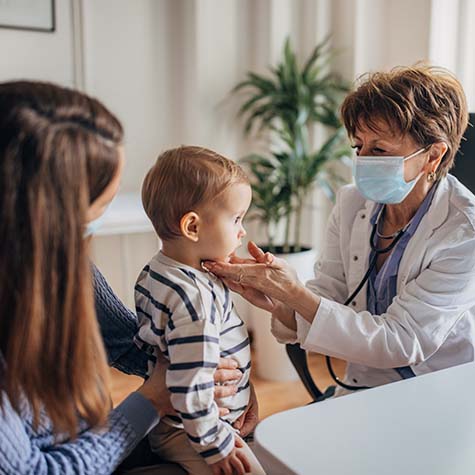Immune Systems 101: What They Are and What Immune Disorders Mean
Here’s what you need to know about the complex network of cells and tissue that make up your child’s immune system–including what happens when it isn’t working right.
The immune system is the body's defense against infections and other harmful invaders. Without it, illnesses from bacteria or viruses, for example, would be constant.
“The immune system is one of the most important organs in our body,” says Niraj C. Patel, MS, MD, allergist and immunologist at Children’s Healthcare of Atlanta. “Physicians at Children’s are specialized to help diagnose and treat your child with immune system disorders, such as frequent or severe infections, unexplained fevers, and other related immune disorders."
Your child’s immune system is made up of special cells, tissues and organs that work together to protect them from illness or infection.

The lymph (or lymphatic) system, a network of lymph nodes and vessels, is a major part of the immune system. Lymphatic vessels are thin tubes that branch, like blood vessels, throughout the body. They carry a clear fluid called lymph, which contains tissue fluid, waste products and immune system cells. Lymph nodes are small, bean-shaped clumps of immune system cells that are connected by lymphatic vessels. They contain white blood cells that trap viruses, bacteria and other invaders, including cancer cells.
White blood cells are the cells of the immune system. They are made in your child’s bone marrow, which is one of the lymph organs. Other lymph organs include the spleen and thymus.
When your child’s immune system doesn't work the way it should, it is called an immune system disorder or immunodeficiency. Your child may:
- Be born with a weak immune system. This is called primary immune deficiency.
- Get a disease that weakens their immune system. This is called acquired immune deficiency.
- Have an immune system that is too active.
- Have an immune system that turns against them, causing conditions called autoimmune diseases.
If your child has a weakened immune system, they may be more susceptible to infection or unwelcomed illness. Some common immunodeficiency disorders in children include:
- Temporary acquired immune deficiencies. Your child’s immune system can be temporarily weakened by certain drugs, such as chemotherapy or other drugs used to treat cancer, or medication to prevent organ rejection following transplant. Also, infections like the flu virus, mononucleosis (mono) and measles can weaken the immune system for a brief time.
- Severe combined immunodeficiency (SCID). This primary immune deficiency that is present at birth puts children in constant danger of infections from bacteria, viruses and fungi. This disorder is sometimes called "bubble boy disease," because in the 1970s, a boy had to live in a sterile environment inside a plastic bubble. Children with SCID are missing important white blood cells.
- Acquired immunodeficiency syndrome (AIDS). Human immunodeficiency virus (HIV), which causes AIDS, is an acquired viral infection that destroys important white blood cells and weakens the immune system. People with HIV/AIDS can become seriously ill with infections that most people are able to fight off. These infections are called "opportunistic infections" because they take advantage of weak immune systems.
If your child is born with certain genes, their immune system may react to substances in the environment that are normally harmless. These substances are called allergens. Having an allergic reaction is the most common example of an overactive immune system. Dust, mold, pollen and foods are examples of allergens.
Some conditions caused by an overactive immune system are:
- Asthma. The response in your lungs can cause coughing, wheezing and trouble breathing. Asthma can be triggered by a common allergen like dust or pollen or by an irritant like tobacco smoke.
- Eczema. An allergen causes an itchy rash known as atopic dermatitis.
- Allergic rhinitis. Sneezing, a runny nose, sniffling and swelling of your nasal passages from indoor allergens like dust and pets or outdoor allergens like pollens or molds.
In autoimmune diseases, the body attacks normal, healthy tissues. The cause is unknown. It can be a combination of a person's genes and something in the environment that triggers those genes.
Three common autoimmune diseases are:
- Type 1 diabetes. In this type of diabetes, your child’s immune system attacks the cells in their pancreas that make insulin. Insulin removes sugar from the blood to use as energy.
- Rheumatoid arthritis. This type of arthritis causes swelling and deformities of your child’s joints. An autoantibody called rheumatoid factor is in the blood of some people with rheumatoid arthritis.
- Lupus. Systemic lupus erythematosus is an autoimmune disease that attacks your child’s body tissues, including the lungs, kidneys and skin. Many types of autoantibodies are found in the blood of people with lupus.
No one knows exactly what causes autoimmune diseases, but many factors seem to be involved. If your child has an immune system disorder, it’s important to learn as much as you can and work closely with your family’s healthcare providers to manage it.
More Parent and Family Resources

Keeping kids healthy
When your child’s immune system isn’t working right, they can become very sick. Here’s what you need to know about immunodeficiencies in children.
see moreNiraj C. Patel, MD, is an Allergist/Immunologist at Children’s Healthcare of Atlanta in Atlanta. Dr. Patel received his medical degree from the University of Louisville. After completing his residency in pediatrics also at the University of Louisville, he went on to complete fellowship training in both Allergy and Immunology and Infectious Diseases at Texas Children’s Hospital, Baylor College of Medicine in Houston, Texas. During this time, Dr. Patel also received a master’s degree in Clinical Investigation.
Dr. Patel is a member of the Clinical Immunology Society; the American Academy of Allergy, Asthma, & Immunology; the American College of Allergy, Asthma and Immunology; and Infectious Disease Society of America. Dr. Patel has been an author/coauthor of articles published in several peer-reviewed journals, including New England Journal of Medicine, Journal of Allergy and Clinical Immunology, and Journal of Clinical Immunology. He currently serves as Chair of the ACAAI COVID-19 Vaccine Taskforce Committee and was awarded the ACAAI Distinguished Service Award in 2021.
His academic and clinical interests include primary immunodeficiency diseases and infections in immunocompromised hosts. Dr. Patel enjoys spending time with his wife, gardening, chauffeuring his three children around town, and is a national Gold Medal Champion in Tae Kwon Do.
This content is general information and is not specific medical advice. Always consult with a doctor or healthcare provider if you have any questions or concerns about the health of a child. In case of an urgent concern or emergency, call 911 or go to the nearest emergency department right away. Some physicians and affiliated healthcare professionals on the Children’s Healthcare of Atlanta team are independent providers and are not our employees.
Contact Us 404-785-KIDS (5437)


